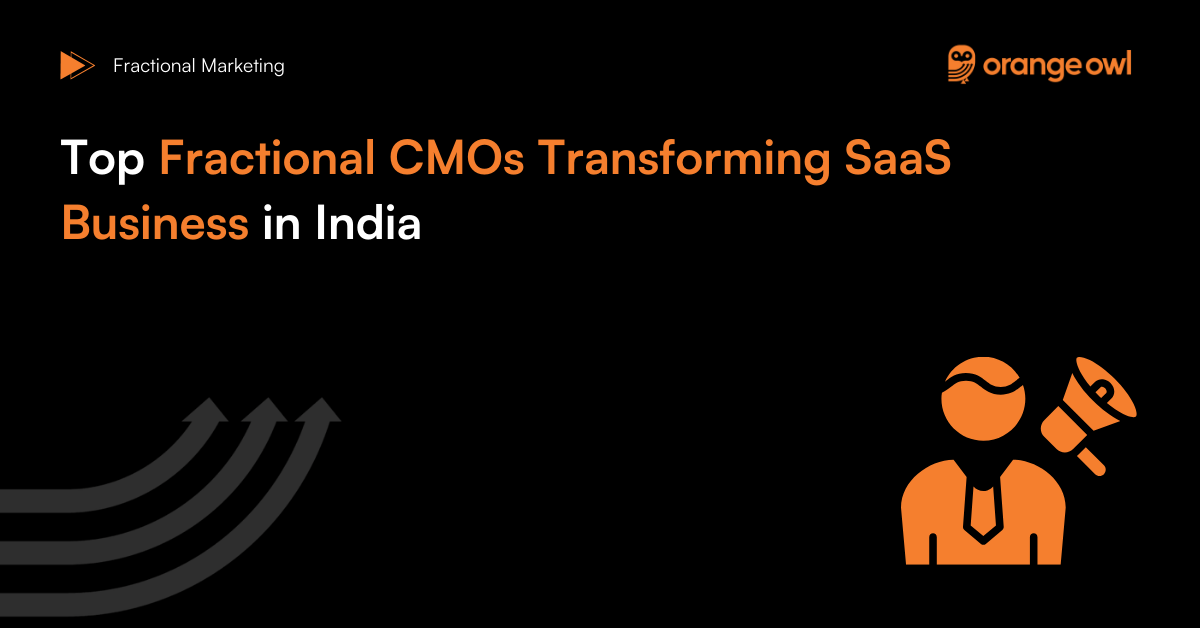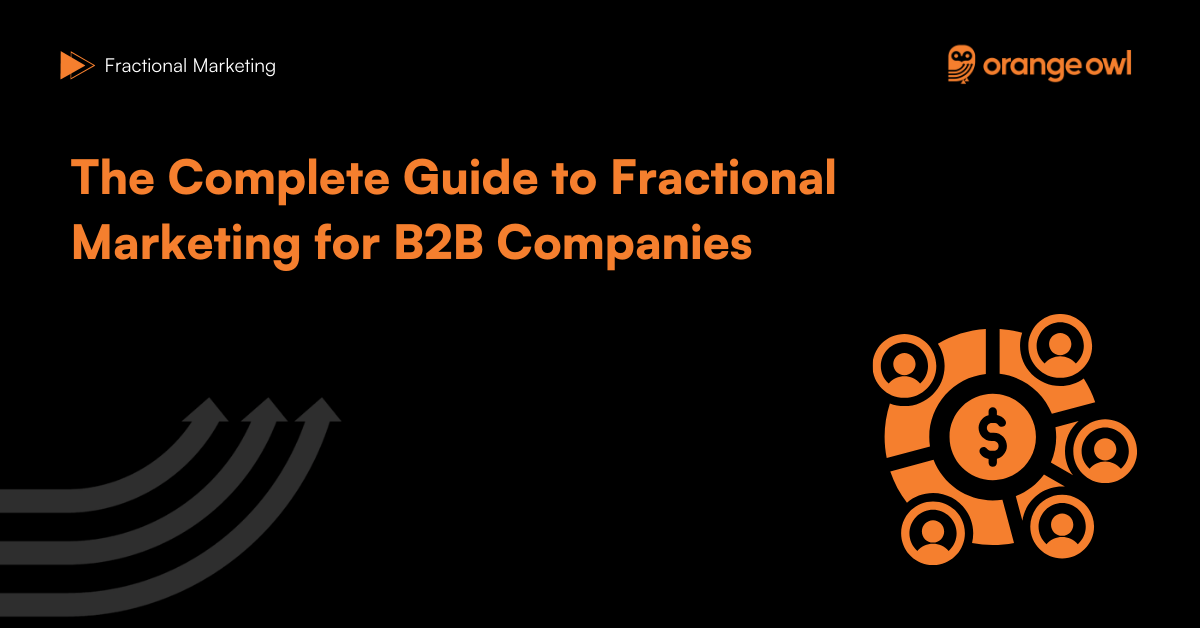Maximizing B2B Growth with a Fractional CMO: The Ultimate Guide
Vivek Goel
July 31, 2024
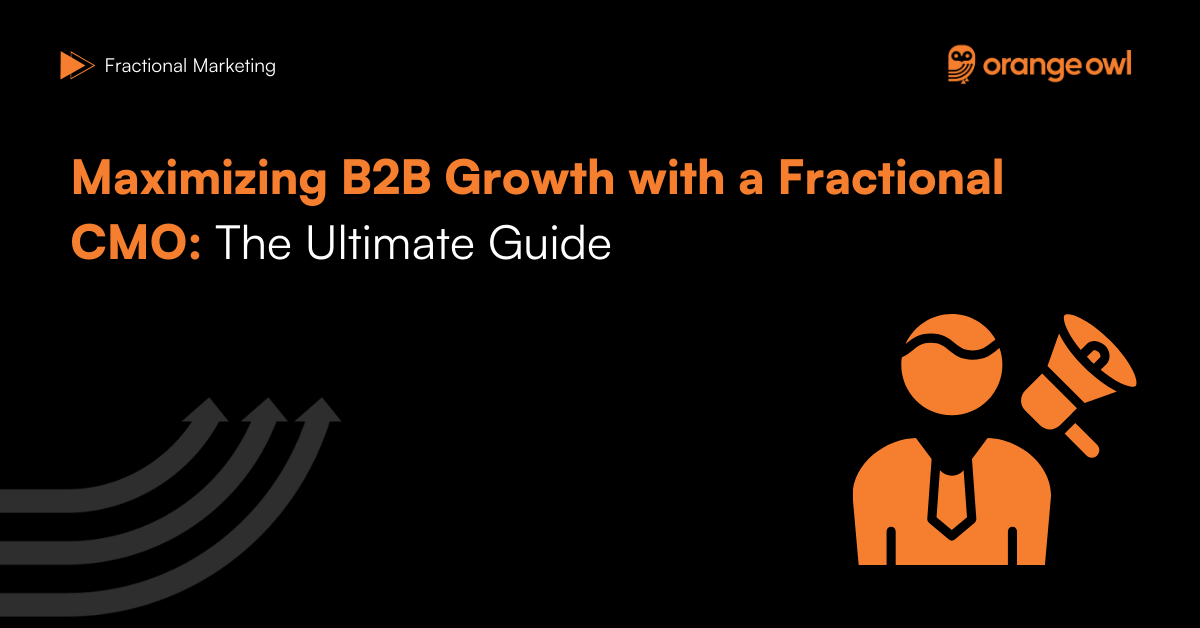
Table of Contents
In today’s competitive landscape, B2B businesses face numerous challenges when it comes to B2B marketing. From limited budgets to the need for specialized expertise, the hurdles can be daunting. This is where the concept of a fractional CMO (Chief Marketing Officer) and fractional marketing come into play.
A fractional CMO provides the strategic direction and marketing leadership that businesses need, while fractional marketing allows companies to access specialized skills—such as content marketing, SEO, and performance management—on a part-time or project basis, all without the full-time commitment and cost of traditional hiring models.
In this blog, we will delve into what a fractional CMO is, the benefits they bring to B2B businesses, common misconceptions, and how to leverage their expertise for maximum impact.
What is a Fractional CMO?
A fractional CMO is a marketing executive who works with businesses on a part-time basis. They bring a wealth of experience and strategic insight to the table, helping companies develop and implement effective marketing strategies. Unlike a full-time CMO, a fractional CMO can be hired for a specific number of hours per week or month, making them a cost-effective solution for businesses that need high-level marketing expertise but cannot afford or justify a full-time executive.
How Fractional CMOs Differ from Traditional CMOs
Fractional CMOs bring the same strategic vision and leadership as traditional CMOs but with a flexible, cost-effective model. Here’s how they differ:
1. Flexibility and Cost-Effectiveness
Fractional CMO: Engaged on a part-time basis, providing high-level expertise without the full-time salary and benefits. Ideal for companies needing strategic input but not daily oversight.
Traditional CMO: Full-time executive with a high salary and benefits package. Best suited for larger companies needing daily strategic leadership.
2. Immediate Impact
Fractional CMO: Quickly implements proven strategies and best practices, often resulting in immediate improvements in marketing performance.
Traditional CMO: May take longer to implement changes due to the broader scope of their role and responsibilities.
3. Fresh Perspective
Fractional CMO: Offers an objective viewpoint, free from internal politics, and brings diverse experiences from working with multiple companies.
Traditional CMO: Provides deep, long-term insights into the company’s culture and history, which can be beneficial but sometimes limiting.
Here is a tabular comparison of a traditional CMO and a fractional CMO across seven key aspects:
| Aspect | Traditional CMO | Fractional CMO |
|---|---|---|
| Employment Model | Full-time employee with a permanent position. | Part-time, flexible, and hired on a contract basis. |
| Cost | High salary with benefits and bonuses. | Cost-effective, paid only for the hours or projects needed. |
| Scope of Work | Comprehensive oversight of all marketing functions. | Focused on strategic projects and high-impact initiatives. |
| Engagement Duration | Long-term commitment to the organization. | Short-term or project-based, with potential for renewal. |
| Perspective | Deeply embedded in the company culture and history. | Provides an external, objective perspective. |
| Scalability | Limited flexibility to scale efforts quickly. | Easily scalable based on the company’s changing needs. |
| Speed of Implementation | May require time to implement changes due to broader scope. | Can rapidly implement proven strategies and best practices. |
This comparison highlights the strengths of each role, helping businesses decide which type of CMO aligns with their strategic goals and resource availability.
Do You Need a Traditional CMO or a Fractional CMO?
Determining whether your company needs a traditional or fractional CMO depends on several factors:
- Stage of Growth: Startups and growing businesses often benefit from the flexibility and cost-effectiveness of a fractional CMO. Established companies with complex marketing needs may require a full-time CMO.
- Budget: If budget constraints are a concern, a fractional CMO provides high-level expertise at a lower cost than a full-time CMO.
- Specific Needs: Companies needing specialized expertise for short-term projects or strategic initiatives may find a fractional CMO more beneficial.
- Internal Team: If you already have a strong internal marketing team but lack strategic direction, a fractional CMO can provide the leadership needed without the full-time commitment.
Additional Notes
Traditional CMO: Best suited for large organizations with complex, ongoing marketing needs. They provide consistent leadership and in-depth knowledge of the company’s operations.
Fractional CMO: Ideal for startups, small to medium-sized businesses, or companies in transition. They bring specialized expertise and can focus on specific challenges without the long-term financial commitment.
Key Responsibilities of a Fractional CMO
A fractional CMO wears many hats and functions as a strategic leader, marketing expert, and operational guide for businesses. They provide the same level of expertise and leadership as a full-time Chief Marketing Officer but are engaged on a part-time or project-specific basis. Below is a deeper dive into their core responsibilities and how they add value to an organization.
1. Strategic Planning
One of the primary roles of a Fractional CMO is to design and implement a comprehensive marketing strategy that aligns seamlessly with the company’s overarching business goals and vision. This involves:
- Assessing the current marketing landscape and identifying gaps.
- Establishing short-term and long-term marketing objectives.
- Creating detailed roadmaps to achieve brand growth, customer acquisition, and revenue targets.
- Ensuring that all marketing initiatives are measurable and linked to key performance indicators (KPIs).
A well-thought-out strategy developed by a Fractional CMO serves as the backbone of all marketing efforts, ensuring alignment across teams and channels.
2. Brand Management
Brand consistency and recognition are crucial for building trust and loyalty among customers. A Fractional CMO is responsible for:
- Defining or refining the brand’s value proposition and positioning.
- Crafting a consistent tone, voice, and visual identity across all platforms.
- Monitoring brand perception in the market and making necessary adjustments.
- Managing crises or reputation challenges that may impact the brand.
By overseeing brand management, a Fractional CMO ensures that the business stands out in competitive markets while maintaining a strong and positive presence.
3. Market Research
A Fractional CMO relies heavily on data-driven insights to inform their strategies. They conduct in-depth market research to:
- Understand current industry trends and emerging opportunities.
- Analyze competitor strengths, weaknesses, and strategies.
- Gather customer feedback and insights to improve targeting and messaging.
- Identify new markets or segments for growth.
Market research enables a Fractional CMO to make informed decisions, ensuring that marketing efforts resonate with the target audience and remain competitive.
4. Campaign Oversight
Marketing campaigns are the lifeblood of brand visibility and lead generation. A Fractional CMO is responsible for designing and managing these campaigns, ensuring their success through:
- Developing creative concepts that align with the company’s goals.
- Selecting the right mix of marketing channels, including social media, email, paid advertising, content marketing, and events.
- Monitoring campaign performance metrics and making data-driven adjustments in real time.
- Ensuring a cohesive message is communicated across all touchpoints.
With their expertise, a Fractional CMO ensures campaigns are not just creative but also results-oriented, driving maximum ROI.
5. Team Leadership
A Fractional CMO often collaborates with internal teams and external agencies, providing guidance and leadership to:
- Align all stakeholders with the marketing strategy.
- Set clear objectives and expectations for marketing teams.
- Mentor team members, fostering a culture of innovation and continuous improvement.
- Bridge communication gaps between different departments to ensure cross-functional alignment.
Effective team leadership by a Fractional CMO enhances collaboration and drives the efficient execution of marketing plans.
6. Budget Management
One of the most critical aspects of a marketing function is managing the budget effectively. A Fractional CMO ensures that every dollar spent contributes to measurable outcomes by:
- Setting realistic budgets based on the company’s financial capacity and marketing goals.
- Prioritizing investments in high-impact channels and initiatives.
- Monitoring spending versus results to optimize resource allocation.
- Identifying cost-saving opportunities without compromising on quality or effectiveness.
This careful stewardship of resources ensures that marketing efforts are impactful and cost-effective.
Who Needs a Fractional CMO in a B2B Perspective?
1. Startups and Small Businesses
Startups and small businesses often lack the budget for a full-time CMO but still need expert guidance to grow and scale their operations. A fractional CMO provides the necessary strategic leadership without full-time costs.
2. Mid-Sized Companies
Mid-sized companies experiencing rapid growth or launching new products can benefit from the specialized skills of a Fractional CMO to navigate these critical phases.
3. Companies in Transition
Organizations undergoing significant changes, such as mergers, acquisitions, or leadership transitions, can leverage a Fractional CMO to ensure continuity and strategic alignment during these periods.
4. Resource-Constrained Marketing Teams
Companies with small or overstretched marketing teams can bring in a Fractional CMO to provide strategic oversight, allowing internal teams to focus on execution.
Top Benefits and Strategic Value of Hiring a Fractional CMO for B2B Businesses
Hiring a fractional CMO offers businesses a unique blend of flexibility, cost-effectiveness, and impactful expertise. Below are the key benefits, supported by real-world cases that demonstrate their value.
1. Cost-Effective Expertise
Fractional CMOs provide top-tier marketing leadership without the expense of a full-time hire. This is especially advantageous for small and medium-sized B2B companies with limited budgets.
Case: An early-stage FinTech SaaS startup sought to establish its brand and execute a digital campaign with minimal resources.
Outcome: The fractional CMO developed a compelling brand story emphasizing financial inclusivity and ran a lean LinkedIn and Google Ads campaign, generating a 200% ROI. This positioned the startup as a credible market player, attracting its first 1,000 customers.
2. Flexibility and Scalability
Fractional CMOs adapt their involvement based on business needs, scaling efforts up or down as required. This is invaluable during high-intensity periods like product launches or quieter phases.
Case: A growing e-commerce platform planning to enter international markets engaged a fractional CMO for six months to oversee a US product launch.
Outcome: The CMO conducted market research, identified customer preferences, and launched a phased campaign using social media and email. Sales exceeded expectations by 25%, with strong customer feedback.
3. Immediate Impact
With extensive experience, fractional CMOs quickly identify challenges and implement actionable strategies, ensuring businesses see results without delay.
Case: A mid-sized SaaS company faced declining lead generation and conversions.
Outcome: The fractional CMO optimized blog content for SEO and implemented tools like SEMrush and HubSpot. Within three months, organic traffic rose by 40%, and improved lead quality led to 35% more conversions.
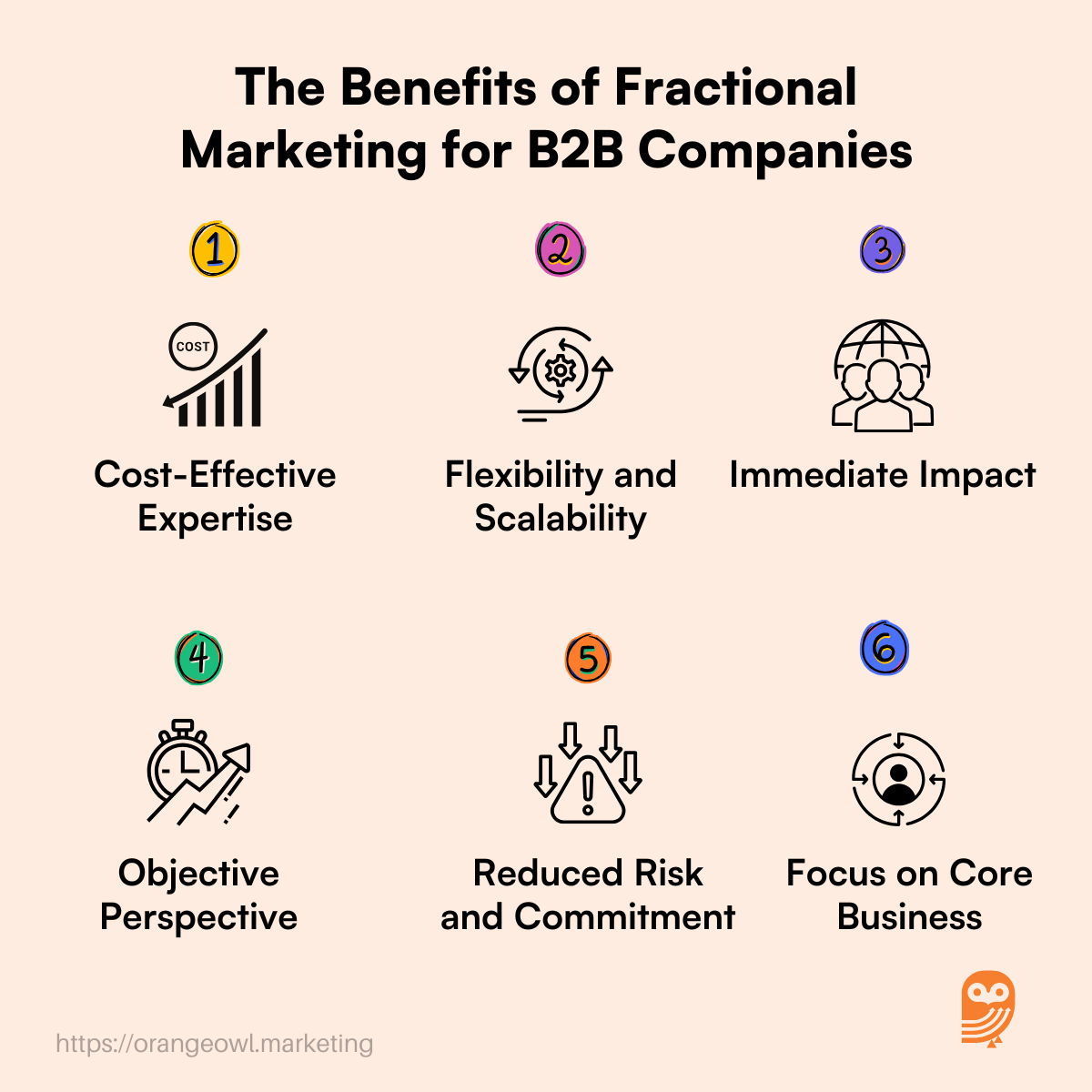
4. Objective Perspective
As external consultants, fractional CMOs provide unbiased insights, free from internal politics or historical biases, enabling businesses to discover blind spots and new opportunities.
Case: A healthcare technology startup entering the Indian market needed local insights.
Outcome: The fractional CMO designed culturally appropriate marketing campaigns, partnered with local influencers, and conducted awareness webinars. This approach secured a 10% market share within the first year.
5. Strategic Leadership Without Long-Term Costs
Fractional CMOs bring the expertise of a full-time CMO without the associated overhead. They work on a project or retainer basis, making them ideal for businesses with constrained budgets or temporary needs.
Case: A subscription-based SaaS project management tool aimed to scale globally and optimize its marketing funnel for diverse audiences.
Outcome: The CMO redesigned pricing models for global customer segments and implemented account-based marketing (ABM) for enterprise clients. The company expanded into three new markets, increasing its customer base by 50% and revenue by 40% within a year.
6. Focus on Core Business
By delegating marketing leadership to a fractional CMO, senior executives can focus on product development, sales, and operations while trusting the marketing strategy to seasoned professionals.
Case: An established B2B company required marketing transformation during a critical growth phase.
Outcome: The fractional CMO handled strategy and execution, enabling leadership to concentrate on operational scaling. The company reported seamless growth and significant marketing improvements.
Checkout Top 10 Benefits of a Fractional CMO: Detailed Insights with B2B Examples
What Makes a Good Fractional CMO?
1. Relevant Experience
A good Fractional CMO should have a proven track record of success in your industry or a related field. Their experience should align with your company’s needs and goals.
2. Strategic Vision
They should be able to develop and articulate a clear, strategic vision for your company’s marketing efforts, aligning with overall business objectives.
3. Strong Leadership Skills
Effective leadership skills are crucial, as the Fractional CMO will need to inspire and guide your marketing team, even on a part-time basis.
4. Excellent Communication
Communication is key. A good Fractional CMO must effectively communicate their strategies, expectations, and feedback to all stakeholders.
5. Results-Oriented
A focus on measurable results is essential. Look for a Fractional CMO who can demonstrate their impact through quantifiable outcomes.
What are Common Misconceptions About Fractional CMOs?
Misconception 1: Fractional CMOs Are Just Consultants
While fractional CMOs do offer consulting services, their role goes beyond that. They are integrated into the company’s leadership team, providing ongoing strategic direction and hands-on involvement in marketing execution.
Misconception 2: They Don’t Understand the Business
Fractional CMOs often have diverse industry experience, making them versatile and adaptable to different business environments. Their broad expertise allows them to quickly understand and address any business’s unique challenges.
Misconception 3: They Are Temporary Fixes
Although fractional CMOs can be hired for short-term projects, many businesses engage them for long-term partnerships. They provide continuous value by adapting strategies as the business evolves and grows.
Misconception 4: They Lack Commitment
Fractional CMOs are highly committed to their clients’ success. Their reputation depends on delivering results, and they often go above and beyond to ensure their strategies are effective and impactful.
How to Choose the Right Fractional CMO?
Selecting the right fractional CMO involves careful consideration of several key factors:
Finding the right Fractional Chief Marketing Officer (CMO) for your B2B business can be transformative, but the process requires careful evaluation to ensure the partnership aligns with your goals, culture, and budget. Here’s a detailed guide to help you make the best choice:
1. Define Goals and Objectives
Before starting your search, clearly outline what you want to achieve by bringing a Fractional CMO on board.
- User Acquisition: Are you looking to grow your customer base through targeted campaigns?
- Brand Building: Is your focus on improving brand visibility and establishing authority in the SaaS market?
- Scaling Operations: Do you need help expanding into new markets, launching new products, or enhancing customer retention strategies?
Example: If your goal is to increase Monthly Recurring Revenue (MRR) by 50%, the Fractional CMO should have a track record in optimizing pricing strategies, improving conversion rates, and scaling marketing campaigns.
2. Check Experience in B2B Marketing
B2B businesses operate differently from traditional models, with unique challenges like subscription-based revenue, churn management, and fast-evolving customer needs. Ensure the Fractional CMO has:
- Experience with B2B metrics such as Customer Acquisition Cost (CAC), Customer Lifetime Value (CLTV), and Net Revenue Retention (NRR).
- A history of working with B2B companies at a similar stage as yours—whether startup, growth stage, or enterprise-level.
Example: A candidate who has successfully scaled a B2B product’s ARR from $500K to $5M demonstrates the ability to drive impactful growth.
3. Ask for Case Studies or Portfolios
Review the candidate’s past projects to evaluate their expertise and approach. Ask for case studies that highlight:
- Campaign goals and the strategies implemented to achieve them.
- Key performance indicators (KPIs) and measurable results.
- Challenges encountered and how they were addressed.
Example: A case study showing a 300% boost in user acquisition through a mix of content marketing and paid media campaigns can provide confidence in the candidate’s capabilities.
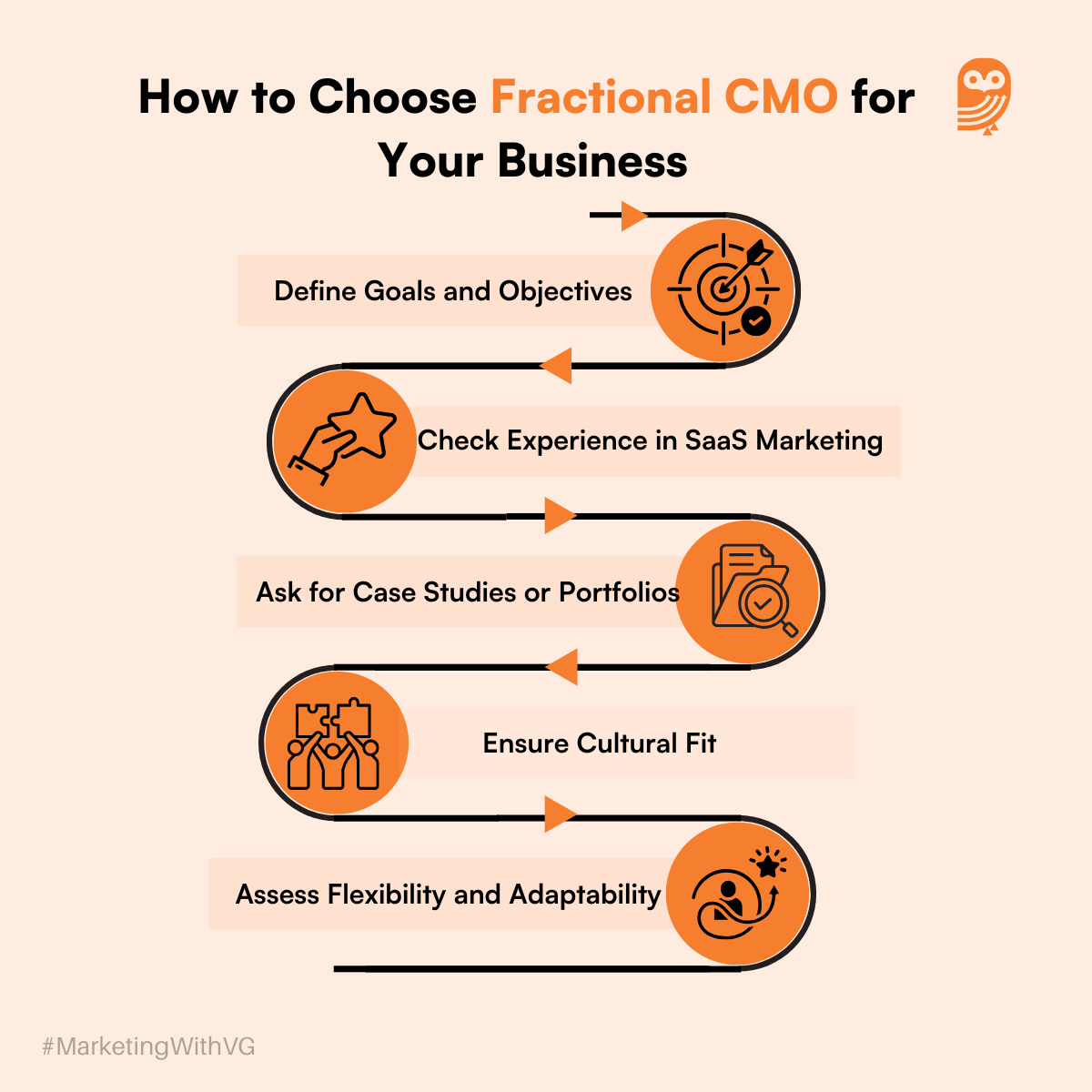
4. Ensure Cultural Fit
The Fractional CMO will be working closely with your team, so their values and work style should align with your company culture. Assess their:
- Communication style: Are they collaborative and transparent?
- Leadership approach: Can they inspire and guide your team?
- Vision alignment: Do they understand your business objectives and share your growth aspirations?
Example: A B2B company prioritizing customer-centric strategies should choose a CMO who emphasizes user engagement and retention over aggressive sales tactics.
5. Assess Flexibility and Adaptability
B2B businesses often face fluctuating needs and budgets, so it’s crucial to choose a Fractional CMO who can adapt to these dynamics. Look for:
- Flexible engagement models, such as hourly, project-based, or retainer agreements.
- Willingness to scale involvement based on your growth stage and marketing budget.
- The ability to pivot strategies as market trends and business priorities evolve.
Example: A startup with a lean budget may benefit from a Fractional CMO who can focus on high-impact, cost-effective strategies like inbound marketing and SEO and scale to broader campaigns as the company grows.
How to Leverage a Fractional CMO for Maximum Impact
1. Define Clear Objectives
Before bringing a fractional CMO on board, it’s essential to define clear objectives and expectations. What are the specific goals you want to achieve with their help? Whether it’s increasing brand awareness, generating leads, or entering a new market, having well-defined goals will ensure that the fractional CMO can develop a focused and effective strategy.
2. Choose the Right Fit
Selecting the right fractional CMO is crucial. Look for someone with experience in your industry and a track record of success in similar roles. They should have a deep understanding of B2B marketing and be able to adapt to the unique challenges of your business. Conduct thorough interviews and check references to ensure a good fit.
3. Foster Collaboration
A fractional CMO should not work in isolation. For them to be effective, they need to collaborate closely with your internal team. Encourage open communication and regular check-ins to ensure alignment and integration with ongoing projects. This collaborative approach will help in the seamless execution of marketing strategies.
4. Monitor and Measure Performance
Set up clear KPIs and metrics to track the performance of your fractional CMO. Regularly review progress and provide feedback. This will not only ensure accountability but also help in making necessary adjustments to the strategy. Common metrics to monitor include lead generation, conversion rates, website traffic, and ROI on marketing campaigns.
5. Utilize Their Network
Experienced fractional CMOs often come with an extensive network of industry contacts. Leverage these connections to explore new partnerships, media opportunities, and vendor relationships. Their network can provide valuable resources and open doors that might otherwise be inaccessible.
6. Focus on Long-Term Growth
While fractional CMOs can deliver quick wins, it’s essential to also focus on long-term growth. Work with your fractional CMO to develop sustainable marketing strategies that will drive growth over the long term. This might include building a robust content marketing plan, enhancing your digital presence, or developing a comprehensive customer retention strategy.
Real-World Example: Scaling a B2B SaaS Startup
The Challenge
A B2B SaaS startup specializing in project management tools was looking to scale its operations quickly. Despite having a solid product, the company struggled with low website traffic and insufficient lead generation. They decided to bring in a fractional CMO with a proven track record of scaling SaaS businesses.
The Solution
The fractional CMO began by conducting a thorough market analysis and competitive review. They identified key areas for improvement and developed a comprehensive marketing strategy focusing on content marketing, SEO, and targeted digital campaigns.
- Content Marketing: The CMO led the creation of high-quality, informative content that addressed the pain points of their target audience. This included blog posts, whitepapers, and case studies showcasing the benefits of the project management tool.
- SEO Optimization: By optimizing the website for relevant keywords, the company saw a significant increase in organic search traffic. The CMO also implemented a backlink strategy to improve the site’s domain authority.
- Targeted Campaigns: The CMO launched targeted digital advertising campaigns on platforms like LinkedIn and Google Ads. These campaigns were tailored to reach decision-makers in the startup’s target industries.
The Results
Within six months, the company experienced a 150% increase in website traffic and a 200% increase in the number of free trial sign-ups. The targeted campaigns generated high-quality leads, which resulted in a significant boost in sales conversions. The fractional CMO’s strategic direction and hands-on execution were pivotal in driving this growth.
Conclusion
Hiring a fractional CMO can be a game-changer for B2B businesses looking to enhance their marketing efforts without the high cost of a full-time executive. By providing strategic direction, leadership, and expertise, a fractional CMO can help businesses achieve their marketing goals, drive growth, and stay competitive in the market. Whether you are looking to enter new markets, rebrand, or simply improve your marketing ROI, a fractional CMO could be the key to unlocking your business’s potential.
Top Frequently Asked Questions (FAQs) for Fractional CMO
The duration can vary based on the project’s scope and company needs, ranging from a few months to several years. Typically, engagements last 6 to 12 months to implement and refine strategic initiatives effectively.
Fractional CMOs work closely with existing teams, providing strategic guidance and mentoring. They often take a hands-on approach to ensure seamless integration and alignment with company goals, fostering collaboration and knowledge sharing.
Industries that benefit the most include technology, SaaS, manufacturing, professional services, and healthcare. These sectors often require specialized marketing strategies and benefit from the expertise and flexibility that a fractional CMO offers.
Performance is measured through key performance indicators (KPIs) such as lead generation, conversion rates, revenue growth, brand awareness, and ROI from marketing activities. Regular progress reports and performance reviews help assess the impact.
Costs can vary widely depending on the CMO’s experience and the project’s complexity. Typically, fractional CMOs charge hourly rates, monthly retainers, or project-based fees, which can range from $150 to $400 per hour or $5,000 to $15,000 per month.
Yes, fractional CMOs often have extensive experience in digital transformation. They can develop and implement digital marketing strategies, leverage advanced analytics, integrate marketing automation tools, and enhance online presence to drive growth.
Fractional CMOs stay updated through continuous learning, attending industry conferences, participating in webinars, reading industry publications, and engaging with professional networks. This ensures they bring the latest insights and technologies to their clients.
Challenges include aligning with company culture, integrating with existing teams, understanding complex industry dynamics, and managing stakeholder expectations. Effective communication and clear goal-setting help overcome these challenges.
Yes, fractional CMOs can help develop strategies for entering new international markets. They bring experience in global marketing, understand cultural differences, and can craft tailored strategies to penetrate foreign markets effectively.
Transition steps include assessing the company’s long-term needs, evaluating the fractional CMO’s performance, and considering organizational growth. If a full-time CMO is needed, the fractional CMO can assist in the hiring process and provide a smooth transition.

